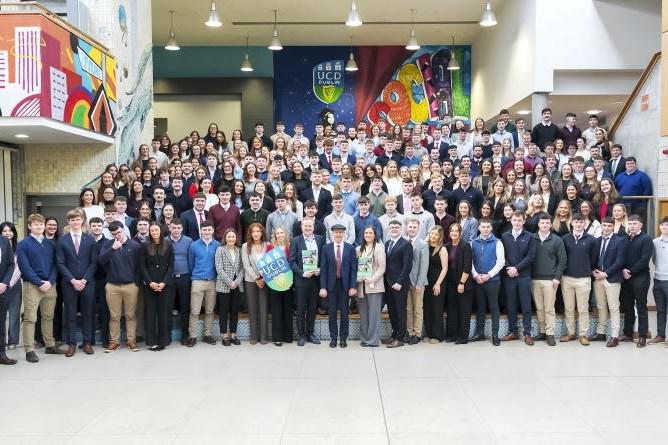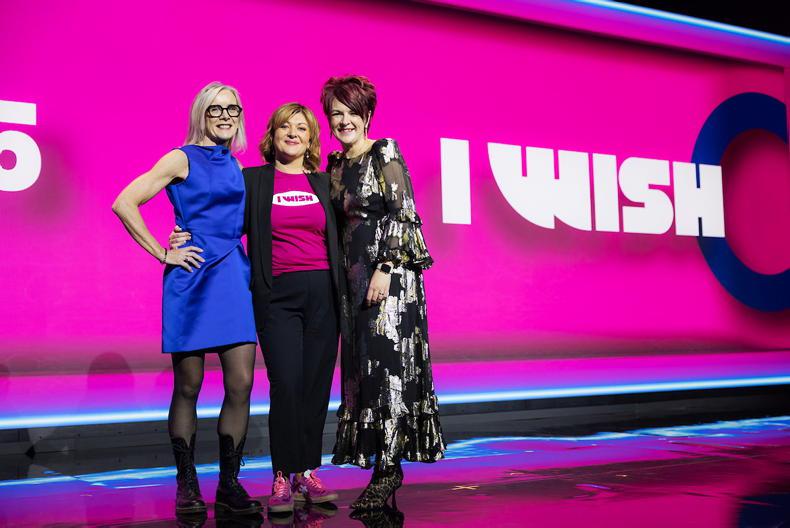In the eighth annual Great Agri-Food Debate final, organised by Dawn Meats in association with McDonald’s, University College Cork (UCC) took on South East Technological University (SETU) in London on 28 March. ?After an insightful debate, SETU were returned victorious for the
third year in a row.
Background to the competition
The Great Agri-Food Debate was developed to bridge the gap between the meat industry and third-level education. Eight years ago, Dawn Meats decided to collaborate with colleges around the country and within the UK, offering students a platform to develop their public speaking skills in a competitive environment in front of a judging panel. In the first year of the event, only two teams participated and the interest has been building each year since. This year saw eight teams participate from across Ireland and the UK.

SETU Team members:Aoife Meagher, Owen Maleady, Maud O’Callaghan, Patrick Shanahan [Captain],Ciara Leonard and Cormac Loughran. \ Irina Zakharova.
Motions and topics are selected based on current issues, trends and threats to the sector to encourage research and thought-provoking solutions from the next generation of agri-food graduates.
This year, a hybrid approach was taken, with the preliminary round of debates being held virtually and the final taking place in the prestigious Butcher’s Hall in London. It was the first in-person final since before the COVID-19 pandemic.

The UCC team members: Paul O’Brien, Edmund Casey, Michelle Egan [Captain], Molly Kenny and Barry Stratford with lecturer Alyin Sahin. \ Irina Zakharova.
Commenting after the debate, Dawn Meats CEO Niall Browne said: “Every year at this debate, there are new and complex motions that deserve the attention of our industry. We witnessed some well-accomplished debating from a strong cohort of students whose insights, intelligence and enthusiasm make me really positive about the future of Irish and British agriculture.”
The focus of this year’s competition was on sustainability and its role in the future of the agri-food industry. The group sustainability director at Dawn Meats and Dunbia, Gill Higgins, has been involved in the project for the last three years. She spoke to Irish Country Living at the final.
“It is fantastic to have the teams all back in person – it’s not the same online,” she said. “Our industry is under a lot of pressure when it comes to the environmental impact of food. For us, a big part of our job is that you get the right information out there into the public sphere and [figuring out] how you communicate that in a balanced and fair way.”
A number of ideas and solutions were outlined by the students throughout the debate on what can be done to change the negative perceptions of red meat among consumers.
The motion up for debate was: “The solution to negative consumer perceptions of red meat is more honest
communication.”
UCC team captain Michelle Egan kicked off the debate by proposing the motion and setting the stage for the rest of her team in the opening address. Arguing in support of the motion, she said that this communication can only be achieved if both industry and those involved “can openly and consistently inform consumers of the justifications of common practices in red meat production.”
Main points outlined by the team
Paul O’Brien first outlined the current efforts being taken by the industry to educate consumers about animal welfare, which is maintained throughout production.
The five freedoms of animal welfare are shown on Dawn Meats’ website:
Freedom from hunger and thirst.Freedom from discomfort.Freedom from pain, injury or disease.Freedom from fear and distress.Freedom to express normal behaviour.
Paul says: “This is a fine example of where honest communication is being used between the processors and consumers to educate.” He also outlined the high demand for Irish beef through the grass-based production system, and the honest communication carried out by Bord Bia and Origin Green to promote Irish products.
Negative coverage
It was then over to Barry Stratford, who outlined how negative media coverage is hampering consumer perceptions of red meat. He told the audience: “This must change, this has to change – honest communication is essential.”
Barry also received the best speaker award on the day.
Regarding misconceptions of health issues surrounding red meat, Edmond Casey said, “Fundamentally, the best way for us as an industry to combat the misperception of red meat is [through] more honest communication.”
He also called on industries that produce alternatives to red meat to provide more honest communication to consumers so they can make more informed decisions.
In his opening address, SETU team captain Patrick Shanahan opposed the motion. He said the solution to consumers’ negative perception of red meat is much more complex than more honest communication.
Patrick mentioned a 2021 Bord Bia survey of adult consumers who eat red meat: “The results are stark, they indicate an expected continuation of a downward decline in beef consumption.”
In his final address, he said: “We are losing the heart and minds of consumers in Ireland and the UK despite honest communication. Something radical must be done.”
His team identified a range of solutions they feel “will have far more impact and effect.”
A team effort
The first argument for SETU saw Ciara Leonard analyse consumer concerns around health and nutrition, animal welfare and sustainability, and a fragmented red meat sector which often has different messages, leading to consumer confusion.
Owen Maleady delved into the influence of social media and a changing cultural and social landscape. Analysing the communication strategies of companies in the sector, he maintained that, while the information is honest, it’s not effectively engaging and exciting consumers.
Cormac Laughran outlined solutions that stakeholders can focus on to improve consumer perceptions of red meat: “The sector needs to be more relevant and relatable in its product marketing, which could include convenient options to suit people living in our busy world today.”
He said that although the message around red meat is honest, it’s not relatable to consumers. “Right now red meat is not popular or trending on social media.”

Captain of SETU's debating team Patrick Shanahan receiving the winning trophy of the Great Agri-Food debate from CEO of Dawn Meats Niall Browne.\ Irina Zakharova.
He said we are a society which increasingly eats alone, on the go and for convenience.
He urged producers to create better-fitted products to compete with alternative choices.
Both college teams in the final had no prior debating experience.
Participating in a competition like this promotes problem-solving and innovative thinking. The benefits to the participants include communication and life skills, along with confidence building. It also allows ag science students to bring in issues they have touched on in lectures and expand their knowledge on that topic. UCC captain Michelle Egan said: “It been brilliant to research the really topical motions put before us. It’s great for young people like us to have our voices heard by industry leaders.”
Read more
Agricareers:“Your career is a journey, not a destination”; Sarah Donnelly, Kepak
The Tullamore farm opens its gates to Ag Science students
In the eighth annual Great Agri-Food Debate final, organised by Dawn Meats in association with McDonald’s, University College Cork (UCC) took on South East Technological University (SETU) in London on 28 March. ?After an insightful debate, SETU were returned victorious for the
third year in a row.
Background to the competition
The Great Agri-Food Debate was developed to bridge the gap between the meat industry and third-level education. Eight years ago, Dawn Meats decided to collaborate with colleges around the country and within the UK, offering students a platform to develop their public speaking skills in a competitive environment in front of a judging panel. In the first year of the event, only two teams participated and the interest has been building each year since. This year saw eight teams participate from across Ireland and the UK.

SETU Team members:Aoife Meagher, Owen Maleady, Maud O’Callaghan, Patrick Shanahan [Captain],Ciara Leonard and Cormac Loughran. \ Irina Zakharova.
Motions and topics are selected based on current issues, trends and threats to the sector to encourage research and thought-provoking solutions from the next generation of agri-food graduates.
This year, a hybrid approach was taken, with the preliminary round of debates being held virtually and the final taking place in the prestigious Butcher’s Hall in London. It was the first in-person final since before the COVID-19 pandemic.

The UCC team members: Paul O’Brien, Edmund Casey, Michelle Egan [Captain], Molly Kenny and Barry Stratford with lecturer Alyin Sahin. \ Irina Zakharova.
Commenting after the debate, Dawn Meats CEO Niall Browne said: “Every year at this debate, there are new and complex motions that deserve the attention of our industry. We witnessed some well-accomplished debating from a strong cohort of students whose insights, intelligence and enthusiasm make me really positive about the future of Irish and British agriculture.”
The focus of this year’s competition was on sustainability and its role in the future of the agri-food industry. The group sustainability director at Dawn Meats and Dunbia, Gill Higgins, has been involved in the project for the last three years. She spoke to Irish Country Living at the final.
“It is fantastic to have the teams all back in person – it’s not the same online,” she said. “Our industry is under a lot of pressure when it comes to the environmental impact of food. For us, a big part of our job is that you get the right information out there into the public sphere and [figuring out] how you communicate that in a balanced and fair way.”
A number of ideas and solutions were outlined by the students throughout the debate on what can be done to change the negative perceptions of red meat among consumers.
The motion up for debate was: “The solution to negative consumer perceptions of red meat is more honest
communication.”
UCC team captain Michelle Egan kicked off the debate by proposing the motion and setting the stage for the rest of her team in the opening address. Arguing in support of the motion, she said that this communication can only be achieved if both industry and those involved “can openly and consistently inform consumers of the justifications of common practices in red meat production.”
Main points outlined by the team
Paul O’Brien first outlined the current efforts being taken by the industry to educate consumers about animal welfare, which is maintained throughout production.
The five freedoms of animal welfare are shown on Dawn Meats’ website:
Freedom from hunger and thirst.Freedom from discomfort.Freedom from pain, injury or disease.Freedom from fear and distress.Freedom to express normal behaviour.
Paul says: “This is a fine example of where honest communication is being used between the processors and consumers to educate.” He also outlined the high demand for Irish beef through the grass-based production system, and the honest communication carried out by Bord Bia and Origin Green to promote Irish products.
Negative coverage
It was then over to Barry Stratford, who outlined how negative media coverage is hampering consumer perceptions of red meat. He told the audience: “This must change, this has to change – honest communication is essential.”
Barry also received the best speaker award on the day.
Regarding misconceptions of health issues surrounding red meat, Edmond Casey said, “Fundamentally, the best way for us as an industry to combat the misperception of red meat is [through] more honest communication.”
He also called on industries that produce alternatives to red meat to provide more honest communication to consumers so they can make more informed decisions.
In his opening address, SETU team captain Patrick Shanahan opposed the motion. He said the solution to consumers’ negative perception of red meat is much more complex than more honest communication.
Patrick mentioned a 2021 Bord Bia survey of adult consumers who eat red meat: “The results are stark, they indicate an expected continuation of a downward decline in beef consumption.”
In his final address, he said: “We are losing the heart and minds of consumers in Ireland and the UK despite honest communication. Something radical must be done.”
His team identified a range of solutions they feel “will have far more impact and effect.”
A team effort
The first argument for SETU saw Ciara Leonard analyse consumer concerns around health and nutrition, animal welfare and sustainability, and a fragmented red meat sector which often has different messages, leading to consumer confusion.
Owen Maleady delved into the influence of social media and a changing cultural and social landscape. Analysing the communication strategies of companies in the sector, he maintained that, while the information is honest, it’s not effectively engaging and exciting consumers.
Cormac Laughran outlined solutions that stakeholders can focus on to improve consumer perceptions of red meat: “The sector needs to be more relevant and relatable in its product marketing, which could include convenient options to suit people living in our busy world today.”
He said that although the message around red meat is honest, it’s not relatable to consumers. “Right now red meat is not popular or trending on social media.”

Captain of SETU's debating team Patrick Shanahan receiving the winning trophy of the Great Agri-Food debate from CEO of Dawn Meats Niall Browne.\ Irina Zakharova.
He said we are a society which increasingly eats alone, on the go and for convenience.
He urged producers to create better-fitted products to compete with alternative choices.
Both college teams in the final had no prior debating experience.
Participating in a competition like this promotes problem-solving and innovative thinking. The benefits to the participants include communication and life skills, along with confidence building. It also allows ag science students to bring in issues they have touched on in lectures and expand their knowledge on that topic. UCC captain Michelle Egan said: “It been brilliant to research the really topical motions put before us. It’s great for young people like us to have our voices heard by industry leaders.”
Read more
Agricareers:“Your career is a journey, not a destination”; Sarah Donnelly, Kepak
The Tullamore farm opens its gates to Ag Science students












SHARING OPTIONS